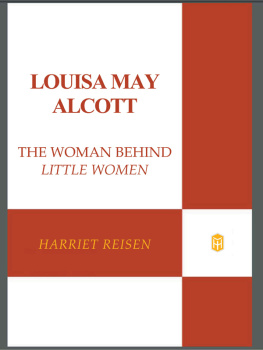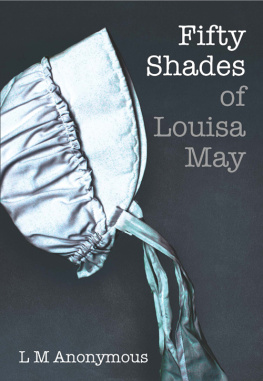CHAPTER I.
GENEALOGY AND PARENTAGE.
TO LOUISA MAY ALCOTT.
BY HER FATHER.
When I remember with what buoyant heart,
Midst war's alarms and woes of civil strife,
In youthful eagerness thou didst depart,
At peril of thy safety, peace, and life,
To nurse the wounded soldier, swathe the dead,
How piercd soon by fever's poisoned dart,
And brought unconscious home, with wildered head,
Thou ever since 'mid langour and dull pain,
To conquer fortune, cherish kindred dear,
Hast with grave studies vexed a sprightly brain,
In myriad households kindled love and cheer,
Ne'er from thyself by Fame's loud trump beguiled,
Sounding in this and the farther hemisphere,
I press thee to my heart as Duty's faithful child.
L OUISA ALCOTT was the second child of Amos Bronson and Abba May Alcott. This name was spelled Alcocke in English history. About 1616 a coat-of-arms was granted to Thomas Alcocke of Silbertoft, in the county of Leicester. The device represents three cocks, emblematic of watchfulness; and the motto is Semper Vigilans.
The first of the name appearing in English history is John Alcocke of Beverley, Yorkshire, of whom Fuller gives an account in his Worthies of England.
Thomas and George Alcocke were the first of the name among the settlers in New England. The name is frequently found in the records of Dorchester and Roxbury, and has passed through successive changes to its present form.
The name of Bronson came from Mr. Alcott's maternal grandfather, the sturdy Capt. Amos Bronson of Plymouth, Conn. "His ancestors on both sides had been substantial people of respectable position in England, and were connected with the founders and governors of the chief New England colonies. At the time of Mr. Alcott's birth they had become simple farmers, reaping a scanty living from their small farms in Connecticut."
Amos Bronson Alcott, the father of Louisa, was born Nov. 29, 1799, at the foot of Spindle Hill, in the region called New Connecticut. He has himself given in simple verse the story of his quaint rustic life in his boyhood, and Louisa has reproduced it in her story of "Eli's Education" (in the Spinning-Wheel Stories), which gives a very true account of his youthful life and adventures. He derived his refined, gentle nature from his mother, who had faith in her son, and who lived to see him the accomplished scholar he had vowed to become in his boyhood. Although brought up in these rustic surroundings, his manners were always those of a true gentleman. The name of the little mountain town afterward became Wolcott, and Louisa records in her journal a pilgrimage made thither in after years.
Louisa Alcott's mother was a daughter of Col. Joseph May of Boston. This family is so well known that it is hardly necessary to repeat its genealogy here. She was a sister of Samuel J. May, for many years pastor of the Unitarian church at Syracuse, who was so tenderly beloved by men of all religious persuasions in his home, and so widely known and respected for his courage and zeal in the Antislavery cause, as well as for his many philanthropic labors.
Mrs. Alcott's mother was Dorothy Sewall, a descendant of that family already distinguished in the annals of the Massachusetts colony, and which has lost nothing of its reputation for ability and virtue in its latest representatives.
Mrs. Alcott inherited in large measure the traits which distinguished her family. She was a woman of large stature, fine physique, and overflowing life. Her temper was as quick and warm as her affections, but she was full of broad unselfish generosity. Her untiring energies were constantly employed, not only for the benefit of her family, but for all around her. She had a fine mind, and if she did not have large opportunities for scholastic instruction, she always enjoyed the benefit of intellectual society and converse with noble minds. She loved expression in writing, and her letters are full of wit and humor, keen criticism, and noble moral sentiments. Marriage with an idealist, who had no means of support, brought her many trials and privations. She bore them heroically, never wavering in affection for her husband or in devotion to her children. If the quick, impatient temper sometimes relieved itself in hasty speech, the action was always large and unselfish.
It will be apparent from Louisa's life that she inherited the traits of both her parents, and that the uncommon powers of mind and heart that distinguished her were not accidental, but the accumulated result of the lives of generations of strong and noble men and women.
She was well born.
Mr. Alcott to Colonel May.
Germantown , Nov. 29, 1832.
Dear Sir ,It is with great pleasure that I announce to you the birth of a second daughter. She was born at half-past 12 this morning, on my birthday (33), and is a very fine healthful child, much more so than Anna was at birth,has a fine foundation for health and energy of character. Abba is very comfortable, and will soon be restored to the discharge of those domestic and maternal duties in which she takes so much delight, and in the performance of which she furnishes so excellent a model for imitation. Those only who have seen her in those relations, much as there is in her general character to admire and esteem, can form a true estimate of her personal worth and uncommon devotion of heart. She was formed for domestic sentiment rather than the gaze and heartlessness of what is falsely called "society." Abba inclines to call the babe Louisa May,a name to her full of every association connected with amiable benevolence and exalted worth. I hope its present possessor may rise to equal attainment, and deserve a place in the estimation of society.
With Abba's and Anna's and Louisa's regards, allow me to assure you of the sincerity with which I am
Yours,
A. Bronson Alcott .
The children who lived to maturity were
Anna Bronson Alcott ,
Louisa May Alcott ,
Elizabeth Sewall Alcott ,
Abba May Alcott .
CHAPTER II.
CHILDHOOD.
TO THE FIRST ROBIN.
Welcome, welcome, little stranger,
Fear no harm, and fear no danger;
We are glad to see you here,
For you sing "Sweet Spring is near."
Now the white snow melts away;
Now the flowers blossom gay:
Come dear bird and build your nest,
For we love our robin best.
Louisa May Alcott.
Concord.
M R. ALCOTT had removed to Germantown, Penn, to take charge of a school, and here Louisa was born, Nov. 29, 1832. She was the second daughter, and was welcomed with the same pride and affection as her elder sister had been. We have this pleasant little glimpse of her when she was hardly a month old, from the pen of one of her mother's friends. Even at that extremely early age love saw the signs of more than usual intelligence, and friends as well as fond parents looked forward to a promising career.
Extract from a Letter by Miss Donaldson.
Germantown, Penn. , Dec. 16, 1832.
I have a dear little pet in Mrs. Alcott's little Louisa. It is the prettiest, best little thing in the world. You will wonder to hear me call anything so young pretty, but it is really so in an uncommon degree; it has a fair complexion, dark bright eyes, long dark hair, a high forehead, and altogether a countenance of more than usual intelligence.
The mother is such a delightful woman that it is a cordial to my heart whenever I go to see her. I went in to see her for a few moments the evening we received your letter, and I think I never saw her in better spirits; and truly, if goodness and integrity can insure felicity, she deserves to be happy.



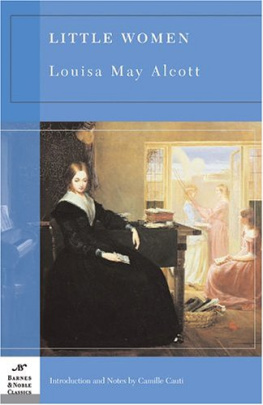
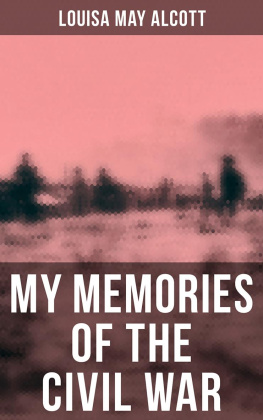
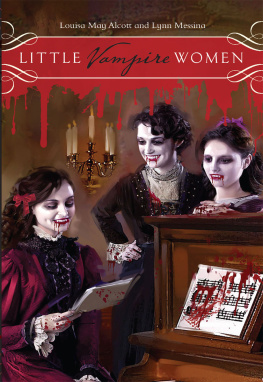

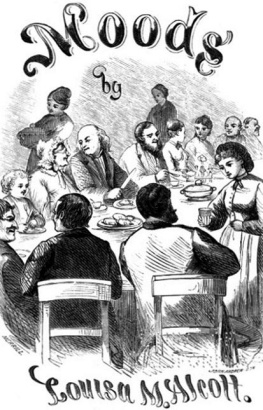

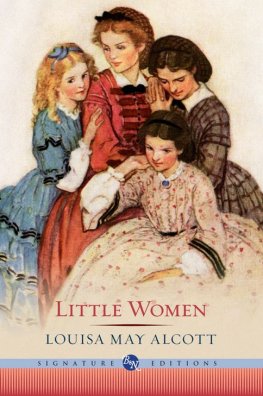

![Alcott - Louisa May Alcott: [a personal biography]](/uploads/posts/book/163779/thumbs/alcott-louisa-may-alcott-a-personal-biography.jpg)
